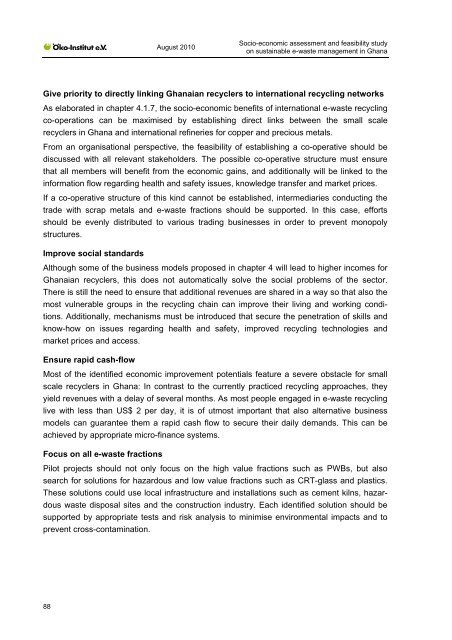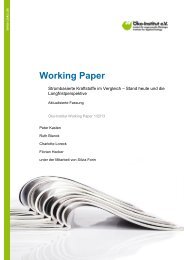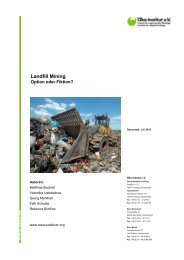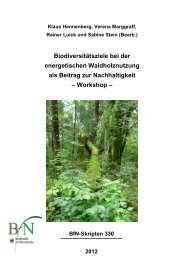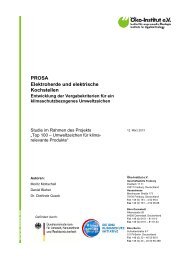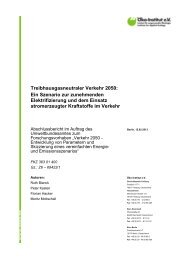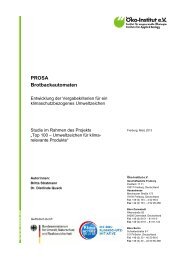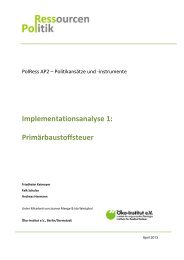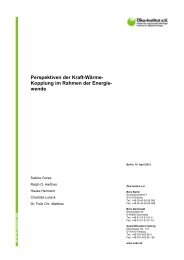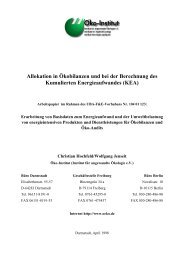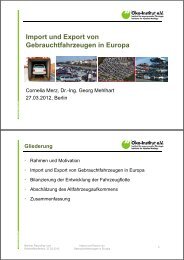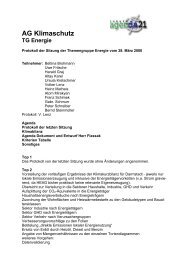Socio-economic assessment and feasibility study on - Öko-Institut eV
Socio-economic assessment and feasibility study on - Öko-Institut eV
Socio-economic assessment and feasibility study on - Öko-Institut eV
Create successful ePaper yourself
Turn your PDF publications into a flip-book with our unique Google optimized e-Paper software.
88<br />
August 2010<br />
<str<strong>on</strong>g>Socio</str<strong>on</strong>g>-<str<strong>on</strong>g>ec<strong>on</strong>omic</str<strong>on</strong>g> <str<strong>on</strong>g>assessment</str<strong>on</strong>g> <str<strong>on</strong>g>and</str<strong>on</strong>g> <str<strong>on</strong>g>feasibility</str<strong>on</strong>g> <str<strong>on</strong>g>study</str<strong>on</strong>g><br />
<strong>on</strong> sustainable e-waste management in Ghana<br />
Give priority to directly linking Ghanaian recyclers to internati<strong>on</strong>al recycling networks<br />
As elaborated in chapter 4.1.7, the socio-<str<strong>on</strong>g>ec<strong>on</strong>omic</str<strong>on</strong>g> benefits of internati<strong>on</strong>al e-waste recycling<br />
co-operati<strong>on</strong>s can be maximised by establishing direct links between the small scale<br />
recyclers in Ghana <str<strong>on</strong>g>and</str<strong>on</strong>g> internati<strong>on</strong>al refineries for copper <str<strong>on</strong>g>and</str<strong>on</strong>g> precious metals.<br />
From an organisati<strong>on</strong>al perspective, the <str<strong>on</strong>g>feasibility</str<strong>on</strong>g> of establishing a co-operative should be<br />
discussed with all relevant stakeholders. The possible co-operative structure must ensure<br />
that all members will benefit from the <str<strong>on</strong>g>ec<strong>on</strong>omic</str<strong>on</strong>g> gains, <str<strong>on</strong>g>and</str<strong>on</strong>g> additi<strong>on</strong>ally will be linked to the<br />
informati<strong>on</strong> flow regarding health <str<strong>on</strong>g>and</str<strong>on</strong>g> safety issues, knowledge transfer <str<strong>on</strong>g>and</str<strong>on</strong>g> market prices.<br />
If a co-operative structure of this kind cannot be established, intermediaries c<strong>on</strong>ducting the<br />
trade with scrap metals <str<strong>on</strong>g>and</str<strong>on</strong>g> e-waste fracti<strong>on</strong>s should be supported. In this case, efforts<br />
should be evenly distributed to various trading businesses in order to prevent m<strong>on</strong>opoly<br />
structures.<br />
Improve social st<str<strong>on</strong>g>and</str<strong>on</strong>g>ards<br />
Although some of the business models proposed in chapter 4 will lead to higher incomes for<br />
Ghanaian recyclers, this does not automatically solve the social problems of the sector.<br />
There is still the need to ensure that additi<strong>on</strong>al revenues are shared in a way so that also the<br />
most vulnerable groups in the recycling chain can improve their living <str<strong>on</strong>g>and</str<strong>on</strong>g> working c<strong>on</strong>diti<strong>on</strong>s.<br />
Additi<strong>on</strong>ally, mechanisms must be introduced that secure the penetrati<strong>on</strong> of skills <str<strong>on</strong>g>and</str<strong>on</strong>g><br />
know-how <strong>on</strong> issues regarding health <str<strong>on</strong>g>and</str<strong>on</strong>g> safety, improved recycling technologies <str<strong>on</strong>g>and</str<strong>on</strong>g><br />
market prices <str<strong>on</strong>g>and</str<strong>on</strong>g> access.<br />
Ensure rapid cash-flow<br />
Most of the identified <str<strong>on</strong>g>ec<strong>on</strong>omic</str<strong>on</strong>g> improvement potentials feature a severe obstacle for small<br />
scale recyclers in Ghana: In c<strong>on</strong>trast to the currently practiced recycling approaches, they<br />
yield revenues with a delay of several m<strong>on</strong>ths. As most people engaged in e-waste recycling<br />
live with less than US$ 2 per day, it is of utmost important that also alternative business<br />
models can guarantee them a rapid cash flow to secure their daily dem<str<strong>on</strong>g>and</str<strong>on</strong>g>s. This can be<br />
achieved by appropriate micro-finance systems.<br />
Focus <strong>on</strong> all e-waste fracti<strong>on</strong>s<br />
Pilot projects should not <strong>on</strong>ly focus <strong>on</strong> the high value fracti<strong>on</strong>s such as PWBs, but also<br />
search for soluti<strong>on</strong>s for hazardous <str<strong>on</strong>g>and</str<strong>on</strong>g> low value fracti<strong>on</strong>s such as CRT-glass <str<strong>on</strong>g>and</str<strong>on</strong>g> plastics.<br />
These soluti<strong>on</strong>s could use local infrastructure <str<strong>on</strong>g>and</str<strong>on</strong>g> installati<strong>on</strong>s such as cement kilns, hazardous<br />
waste disposal sites <str<strong>on</strong>g>and</str<strong>on</strong>g> the c<strong>on</strong>structi<strong>on</strong> industry. Each identified soluti<strong>on</strong> should be<br />
supported by appropriate tests <str<strong>on</strong>g>and</str<strong>on</strong>g> risk analysis to minimise envir<strong>on</strong>mental impacts <str<strong>on</strong>g>and</str<strong>on</strong>g> to<br />
prevent cross-c<strong>on</strong>taminati<strong>on</strong>.


